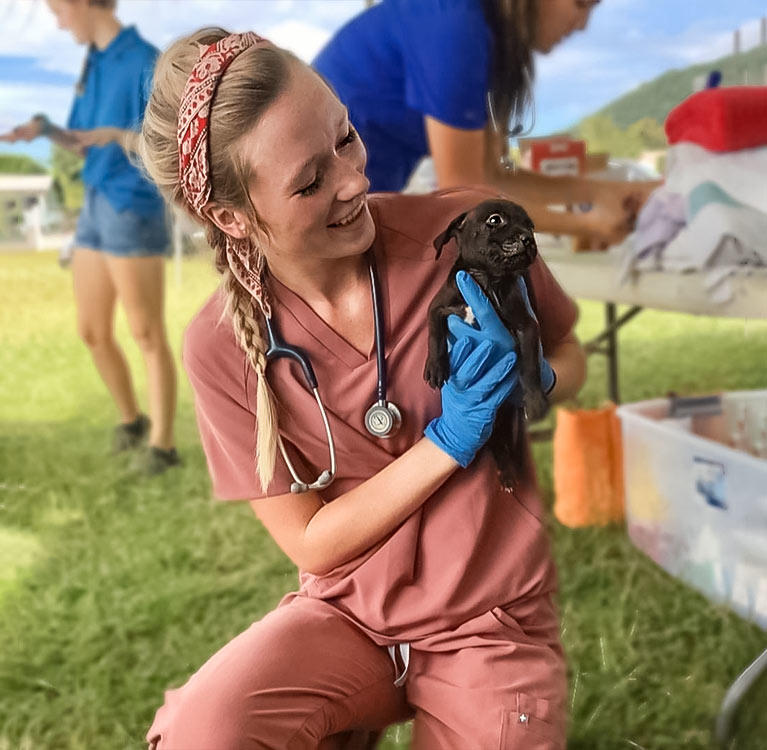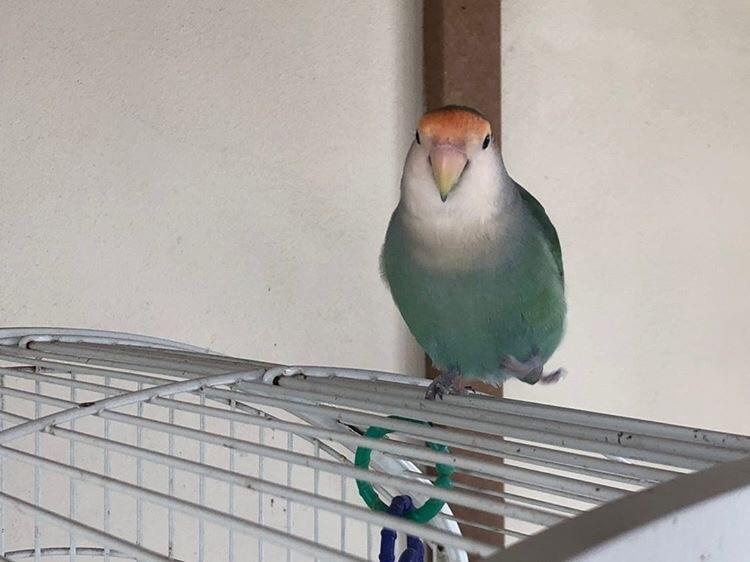The word equine is an adjective meaning of horses. A doctor of equine medicine, then, is a horse veterinarian. Such veterinarians provide complete health care for horses and ponies as well as donkeys and mules, and some even care for their zebra cousins.
Horse veterinarians are large animal specialists who still make “house calls”, often traveling to see their patients. They may deliver a foal, administer a vaccine, or perform a surgery—all in one visit! If you are interested in specializing in equine medicine you should be aware that it can be a long and intense—but rewarding—path. Your veterinary path includes undergraduate study and veterinary school. Some horse doctors further their studies with internships or specialist residencies.
The schooling requires dedication and patience, as well as excellent grades and test scores. It requires a desire to learn and the compassion to help animals live better and healthier lives. Equine veterinarians also typically have a background with horses or a special affinity for the animals.
The steps to becoming an equine medicine veterinarian are detailed below. Consider everything well—it is a big decision to start down the equine medicine path. If you think you want to be a horse veterinarian, ask yourself some questions:
- Do you own or ride horses, or do you admire their beauty?
- Are you interested in donkeys or zebras?
- Do you enjoy the biological sciences?
- Are you fascinated by—and ready to handle—large animal anatomy?
- Do you want a challenging and rewarding career?
- Do you want to combine veterinary medicine with therapy and surgery?
- Are you dedicated to improving the lives of animals?
- Are you an excellent student who wants to continue learning?
If you answered “yes” to one or more of these questions, then a career as an equine medicine veterinarian may be for you.
WHAT DOES AN EQUINE VETERINARIAN DO?
Equine medicine specialists may care for donkeys, mules, ponies, wild horses, or zebras—and some care for such large animals as cows or llamas—but most take care of domesticated horses. For the purposes of this article, all references will be made to such horses, but in most cases the information applies to all equine family members.
Equine vets care for horses from before birth until after death. They may first help horses get pregnant, then care for mares during pregnancy, then deliver the foals. They may administer vaccines and advise on the feeding of young horses. As horses grow into adulthood, the doctor may then treat them for a variety of diseases, disorders, illnesses, and infections. Common diseases and viruses in horses include:
- Botulism
- Clostridial diarrhea
- Encephalomyelitis
- Equine coronavirus
- Equine encephalitis
- Equine herpesvirus (EHV)
- Equine infectious anemia
- Equine protozoal myeloencephalitis (EPM)
- Equine viral arteritis
- Influenza
- Lyme disease
- Pigeon fever
- Potomac horse fever
- Rabies
- Rhodococcus equi
- Rotavirus
- Salmonellosis
- Strangles
- Streptococcus equi
- Tetanus
- Vesicular stomatitis
- West Nile Virus
Horse veterinarians administer medications and treatments for these diseases, and they also perform examinations, lab tests, screenings, and surgeries. They manage emergencies and treat injuries, and they are experts in horse behavior. Horses are large animals and can be dangerous, so equine veterinarians need to be observant and attentive—especially with untrained or poorly-trained horses. Keep in mind, that wild horses and zebras require heavy sedation or full anesthesia, even for minor treatment. This requires special training and the use of distance sedation.
As an equine specialist, you must know how to handle and restrain a horse. This comes in handy during cardiac, dental, endoscopic, musculoskeletal, ophthalmic, parasitic, or respiratory exams, or during procedures which may also require sedation or full anesthesia. Such procedures include:
- Carpal surgery
- Colic surgery
- Computed tomography (CT) scans
- Fetlock surgery
- Joint injections
- Laparoscopy
- Laryngoplasty
- Magnetic resonance imaging (MRI)
- Positron emission tomography (PET) scans
- Radiographs
- Ultrasounds
- X-rays
Equine veterinarians must also be prepared for when horses are at the end of life, often because of debilitation injury. The doctors must be experts in methods of euthanasia, and they may also need to perform necropsies, also known as autopsies for animals.
Equine veterinarians take care of athletic, show, and working horses, as well as those kept for casual riding or pleasure. They may visit farms and ranches to perform routine checks, or they may visit research facilities to make sure horses are healthy and treated humanely. They may work with breeders or racehorse owners and give advice on how to improve a horse’s athletic performance.
Horse veterinarians must be present at all equestrian competitions, where they make sure horse owners follow competition regulations—often by screening for performance-enhancing drugs or even gene doping agents. Equine specialists also help racehorses transition to retirement and prepare them for adoption or retraining. The many guidelines in equine medicine detail such topics as:
- Competition duties
- Drug compounding
- Ethical and professional duties
- Euthanasia
- Foreign animal disease
- Infectious disease control
- Necropsy
- Parasite and vector control
- Rescue and retirement
- Thoroughbred race day injury management
- Transitioning racehorses
- Treating performance horses
- Vaccination
- Venereal disease control
Not all equine veterinarians grew up with horses, but most have had significant horse experience before entering veterinary school. Interested students may gain equine experience in youth horse groups or at riding stables or rescue and retirement facilities.
HOW DO YOU TRAIN FOR EQUINE MEDICINE?
Equine veterinarian education involves becoming a Doctor of Veterinary Medicine (DVM) by attending a veterinary program accredited by the American Veterinary Medical Association (AVMA)—such as the Ross University School of Veterinary Medicine’s (RUSVM) DVM Degree Program*. RUSVM runs an accelerated DVM program of 3.25 years, but most veterinary schools are four years. Some veterinary schools offer special equine and large animal paths of study, during which you learn core competencies and prepare for equine practice. After graduation, most equine DVM’s enter general practice, but some advance to one-year veterinary internships ahead of applying to three- or four-year equine residencies in such subspecialties as:
- Dentistry
- Internal Medicine
- Neurology
- Preventive Medicine
- Radiology
- Surgery
- Theriogenology
- Zoological Medicine
DVM’s are certified in equine practice by the American Board of Veterinary Practitioners, the American College of Veterinary Internal Medicine (ACVIM), and by the board of their eventual specialty. They may apply for membership in the American Association of Equine Practitioners (AEPP), the AVMA, and other professional societies.
As an equine veterinarian, you may end up specializing in a specific type or breed of horse. You could also migrate toward caring only for athletic or show horses or for working or pleasure horses. Or, you may care for a particular breed for which you have a talent and affinity.
A CAREER IN EQUINE MEDICINE
Most equine medicine specialists work in private practice, but many work in government agencies, police departments, research facilities, specialized animal clinics, universities, or zoos. Regardless of where you could call home, nearly all horse doctors provide ambulatory service—meaning you will go to the animals rather than the animals coming to you. This provides a good degree of independence, but also many hours of travelling to and from such horse-inhabited places as farms, racetracks, ranches, stables, and zoos.
Equine veterinarians may work long hours, including weekends, and they are often on-call for emergencies. Aside from examining, diagnosing, and treating their horse patients, you consult with animal owners and organizations, equine care team members, and other veterinary specialists.Many also dedicate time to research, studying, and teaching—some board-certified equine medicine specialists opt for academic positions instead of going into practice.
DEMAND FOR EQUINE MEDICINE SPECIALISTS
Demand for all veterinary specialists is high. According to an AVMA survey and information from USDA’s periodic surveys of farm animal populations it is estimated the United States horse population alone is 3.8 million. With that amount of horses the shortage of equine veterinarians is felt throughout the country, particularly in rural areas. Also, consultations with equine medicine specialists have increased in recent years as horse owners have become more aware of the specialty and the many benefits it can have.
Ross University School of Veterinary Medicine provides an accelerated, broad-based curriculum that integrates unique research opportunities, classroom study, and hands-on clinical training. Take the next step on your path to becoming an equine veterinarian: apply for admission to RUSVM.
Related resources:
*Ross University School of Veterinary Medicine confers a Doctor of Veterinary Medicine (DVM) degree, which is accredited by the American Veterinary Medical Association Council on Education (AVMA COE), 1931 N. Meacham Road, Suite 100, Schaumburg, IL 60173, Tel: 800.248.2862. For more information please visit: https://www.avma.org/education/accreditation-veterinary-colleges.
The AVMA COE uses defined standards to evaluate veterinary medical education programs, including facilities, clinical resources, curriculum, faculty, student outcomes and research programs. The standards are interpreted and applied by the AVMA COE-accredited veterinary medical education programs in relation to its mission.






